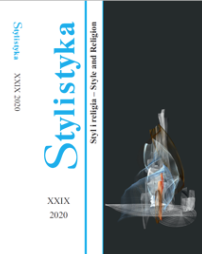Nieświadomy komizm w języku tłumaczeń Biblii. na marginesie czeskiego „Nowego stylu biblijnego”
Unconscious comicality in the language of the Bible translations. On the margin of the Czech “New Biblical Style”
Author(s): Josef BartoňSubject(s): Applied Linguistics
Published by: Uniwersytet Opolski
Keywords: Czech stylistisc; modern Czech Bible transations; CHech new biblical style; modern biblical language; comicality in the Bible
Summary/Abstract: In Czech, modern biblical translation begins in the early 20th century. (The attribute “modern” indicates here the distance to the older tradition of Czech biblical translation from the Middle Ages to the 19th century). Since then, sixteen whole New Testaments and ten whole Old Testaments have been translated and published (which also means nine new whole Bibles) in the Czech language. However, the expert reflection of the Czech new biblical style (or modern biblical language) is still quite insignificant. Generally speaking, the language of modern Bible translations is characterized, among other things, by considerable volatility, internal contrastivity, “extreme markedness” of different types. The article focuses on one partial aspect of “extreme markedness”, in particular, the unconscious comicality of some places in Czech biblical texts. In the paper, four examples are presented and interpreted (Mt 9,16; L 13,7; Apc 2,7; Mt 10,10), taken from four important modern Czech biblical translations (Catholic Czech Bible from the early 20th century; Czech ecumenical translation; Catholic liturgical translation; evangelical Bible of the 21st Century). These examples show how the specific treatment of stylistic means of the Czech language has the potential to give rise to a comic effect (unintended by the translator) among readers/listeners. The author of the article notes that such extremely stylistically problematic places occur across all modern Czech translations of the Scripture. In the background of these stylistically defective places there are psychological and social reasons, given paradoxically by the fact that the biblical text belongs to the sacral sphere. It is thus desirable that the authors of future Biblical translations and critics of translations consciously and intensively try to shape and cultivate the Czech new biblical style (which, even after a hundred years of its existence, is still characterized by considerable instability).
Journal: Stylistyka
- Issue Year: 2020
- Issue No: XXIX
- Page Range: 199-212
- Page Count: 14
- Language: Polish

